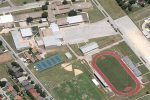Council votes to apply for additional STEP grant
The Caldwell County Appraisal District (CCAD) was the key point of public discussion during a public hearing regarding the City of Lockhart’s 2004-2005 fiscal year budget on Tuesday night.
The City of Lockhart has a $75,000 line item set aside in the budget for payment to the CCAD for property taxes. As Caldwell County’s taxing entities have drafted their
budgets for the coming year, some public outcry has erupted regarding CCAD’s budget. Because CCAD oversees property taxes, all other taxing entities, including the City of Lockhart, are responsible for remitting payment to CCAD for property owned.
Councilmember White requested CCAD be responsible for making a budget presentation to the council before they approve future budgets. Ultimately, however, the council chose to approve the “balanced budget” as written.
During the public hearing and discussion of the 2004-2005 budget, the council discussed the possibility of granting city employees an additional half-a-percent raise in the coming year. Both the council and city staff agreed that the issue of additional pay increases should be examined, added to a future agenda and entered as a budget amendment.
The council presented Sgt. Larry Simmons and the Lockhart Police Department with awards for the effective management of the Selective Traffic Enforcement Program (STEP).
After the presentation, city staff requested that the council approve an application to renew the STEP grant from the Texas Department of Transportation (TxDOT). The program, which focuses on traffic enforcement, particularly along 183 and Highway 20, was met with some resistance.
Councilmember Kenny Roland asked the council to consider not taking the grant this year.
“I’m not saying that [STEP] is not a good program,” Roland said. “I’m saying that we have the traffic under control, from what I can see. I feel that all money is not good money.”
In addition to his concerns that about the grant itself, Roland addressed complaints from citizens in District One suggesting that the STEP Program encourages discrimination against a certain portion of the population.
“I don’t know whether it’s true or not,” he said. “But I do know that there are people in District One that feel like they’re being singled out. We have to be concerned with that perception, because perception can become reality.”
When the issue came up for a vote, Roland’s motion that the city not apply for the grant’s renewal was defeated 6-1, but the council did encourage the Lockhart Police Department to look into any perceived unfairness and work toward building a better relationship with the community.
In response to requests made for financial support during the last city council meeting, the council voted to donate funds to a variety of local charities. After some discussion, they agreed to grant funds to all of the organizations they supported last year, and added one new organization at the request of Councilmember Dick Weiland.
In other business, the council approved a resolution establishing new charges for emergency medical services within the City of Lockhart. Further, they established new water and sewer rates to support the required revenues for the new budget.
They agreed to amend the existing contract with Central Texas Refuse, Inc. The contract amendment will include the hand-collection of commercial and residential refuse. The collection responsibilities, which are currently overseen by city personnel, will become the responsibility of Central Texas Refuse during the next fiscal year.
The City of Lockhart will enter an inter-local agreement with the Texas Municipal League Intergovernmental Employee Benefits Pool for the coming fiscal year.
The council voted to amend zoning regulations regarding “grandfathered,” non-conforming properties. Under the new rules, property that does not conform to current zoning will revert to the primary zoning of the immediate area after six months of vacancy. After the six-month threshold, property owners must either conform to current zoning restrictions or apply for special use permits if they wish to continue with the non-conforming use.



